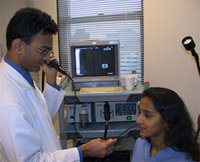 Transnasal Esophagoscopy (TNE) represents the latest advancement in diagnosis of esophageal-related diseases. With the miniaturization of high resolution cameras, it is now possible to create ultra thin endoscopes that are capable of reaching the stomach. Because of the small size of these endoscopes, they can now be passed through the nose with ease. This means that patients no longer need sedation for routine esophagoscopy.
Transnasal Esophagoscopy (TNE) represents the latest advancement in diagnosis of esophageal-related diseases. With the miniaturization of high resolution cameras, it is now possible to create ultra thin endoscopes that are capable of reaching the stomach. Because of the small size of these endoscopes, they can now be passed through the nose with ease. This means that patients no longer need sedation for routine esophagoscopy.
In the past, when a patient complained of difficulty swallowing or had complaints of chronic heartburn, they would be sent for either a barium swallow study or a traditional flexible esophagoscopy. Barium swallow studies are often unreliable. These studies can miss changes in the lining of the esophagus, which may represent small cancers or precancerous lesions. Traditional esophagoscopy requires the use of sedation, which carries certain risks. In addition, patients often have to spend hours preparing and recovering from the procedure. This necessitates taking time off of work or school (for both the patient and often another family member).
With the advent of TNE, patients can have the esophagoscopy right in the office setting without any additional medication. The entire procedure takes less than 10 minutes, and the patient can return to work or school the same day. This saves a lot of time and energy.
What is TNE?
- Transnasal Esophagoscopy is a test to look at your esophagus (the food tube that goes from your mouth into your stomach). This test is done by passing a flexible viewing tube through your nose and the back of your throat into the esophagus. We do this test to find the cause of problems with your voice or with swallowing, heartburn, and other symptoms. Pictures might be taken or a small sample of tissue removed (biopsy). This depends on what your doctor finds.
Getting Ready for TNE
- Do not eat or drink for 4 hours before the test. If you need to take medicine, take it with a small sip of water.
- Tell the nurse or doctor if you have any allergies to Lidocaine or other medicines ending with “caine”.
- Tell us before the test if you are taking blood-thinners (warfarin or Coumadin®). You must ask your local doctor if you are able to stop the drug for a couple of days before the TNE exam. If you do not tell us about taking these drugs, you would have an increased risk of bleeding that could be life-threatening. Please call the ENT clinic at least 4 days before the test if you have any questions about this.
- For 5 days before your TNE, do not take aspirin or medicines containing aspirin. Do not take the anti-inflammatory drugs (ibuprofen, Rufen®, Advil®, Naprosyn®, Feldene®). Acetaminophen (Tylenol®) is OK.
- If you have an artificial heart valve, serious heart murmur, or joint replacement, please tell us when you schedule your appointment. You may need antibiotics to prevent infection.
If you have diabetes, you need to adjust your morning dose of insulin since you will not be eating or drinking on the morning of the test. You should talk this over with your local doctor. Bring your insulin with you to the clinic. Check your blood sugar in the morning before you come to the clinic. Bring the result with you. If you begin to have low blood sugar at home, please drink orange juice or some other liquid with sugar. We may still be able to do the exam unless you need to eat solid food to get your blood sugar back up. It is much more important for you to go ahead and treat your low blood sugar properly than it is to have the endoscopy done right away. The test can always be rescheduled.
The Exam
The test will be done in the ENT Clinic. It will take about 30 minutes. You will be awake the entire time and seated. The doctor will numb your nose and throat with a numbing spray (Lidocaine). A small tube will be passed through your nose down into your esophagus. During the exam you may be asked to swallow or burp. Small puffs of air or water will be put into your esophagus. This might make you feel a little bloated. This can be easily burped or it will pass naturally.
After the Exam
You will remain alert and should not have any pain although you may notice a slight soreness in your nose and throat for a few hours. You will be able to breathe and swallow as before, but do not eat or drink anything for 1 hour after the exam.
After You Go Home
Do not eat or drink for at least 2 hours to allow the numbing medicine to wear off. Then, you may eat as you wish.
You may have mild pain. If it does not go away with the pain medicine your doctor has prescribed, call the doctor.
Do not take aspirin or aspirin-containing medicine since they increase the chance of bleeding.
Resume taking your blood-thinning medicines as directed by your local doctor.
If you have any of these warning signs, do not eat or drink and call your doctor right away.
- Early signs of breathing problems: increased rate of breathing, trouble breathing, and shortness of breath.
- Spitting up bright red blood.
- Fever over 101°F or 38.3°C.
- Chest pain